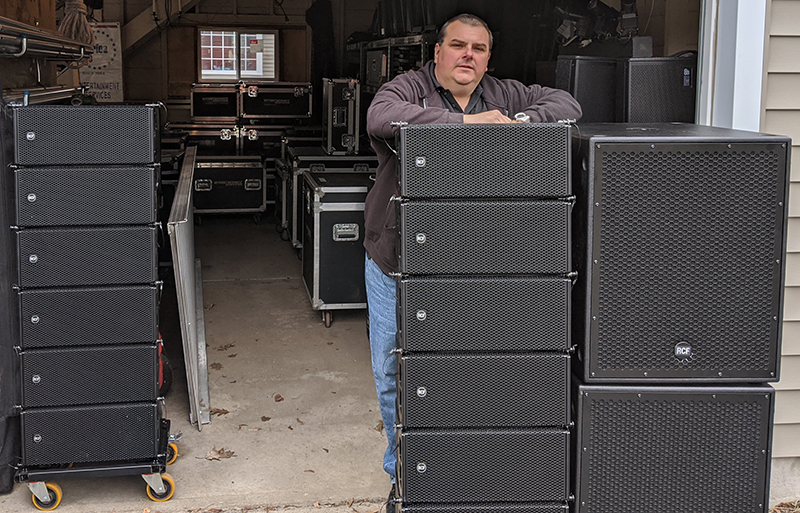Bill Di Paolo has worked in live event production since he could walk. He’s now the owner and technical director of Entertainment Services, a production company based in upstate New York that handles lighting, audio, and video for events of all sizes in the region.
Michael Lawrence: So, I was thinking back and I think the first show we worked on together was 2002, which means we’ve been working together for 18 years. I was in high school and helping you out with lighting.
Bill Di Paolo: Yes. I remember. I came into the theater during the day and you were there. And I said, “What are you doing in here?” and you said, “Oh, I skipped class to come focus the lights,” and then I got yelled at!
ML: Oh, you got in trouble? I didn’t know that!
BD: Yes! [laughs] I told them, “Well, I didn’t know! He was here when I got here!”
ML: That’s funny because I was this kid who thought being able to mix sound was the coolest thing in the world. And you’ve never liked doing audio, so you were glad to let me do it, but I thought I was getting away with something.
BD: And I remember that lighting console the school had – they bought it used and half the faders didn’t work. And the sound system…
ML: Yeah, awful. The coverage started something like 35 feet into the house, so if you were sitting in the first 15 rows you just weren’t going to hear the show. But that set the tone for a lot of the work we do together, I think – we’re working in, let’s say, “imperfect” situations.
BD: All the time! I’m thinking back on all the situations we got the call because someone already dropped the ball in some way. Someone didn’t do his job. Like “Hey, our show opens tomorrow, and we’ve fired our lighting designer, and there are no cues in the board.” And we had to go in there and make it work. My father, who was in the business, taught me “You have to deal with what you get and make it work.”
And that’s what we do. But I can’t tell you the number of times someone messed up and we didn’t get the right information, or made an arrangement without us knowing that put a show in a bad spot. And they call us because they know we’ll make it work.
ML: The trick, to me, is where do you draw that line? If you establish the pattern of “Don’t worry about Bill, he’ll figure it out, we don’t need to keep him in the loop” – which I’ve seen people do – you can really end up with problems. Or when people want to hire you because of your expertise but then ignore what you tell them.

We dealt with this the other day, remember? The client called and said, “We’ve fired our sound tech because the sound was horrible, and we need you to come in for this event, and it has to be perfect.” But they didn’t understand why I wanted my mix position to be in the same room as the show, or why I wanted paddles for the RF, and so on, and now I’m starting to understand why they had a failure last year. If people don’t address any of the reasons for failure, they’re crazy to think they’re not going to have it happen again.
BD: Right, there are so many issues that people aren’t necessarily aware of so they don’t realize there can be a problem. You brought up RF – so often, clients don’t want to hear about it. I dread having that conversation: “My A1 wants paddles side-stage.” So sometimes I tiptoe around these things.
But then on the other hand we’ll get a call and they’ll say, “We rented 24 wireless mics and they don’t work.” Well, that’s because there are three DTV stations blowing through your building. That’s why we recommended doing the coordination that they didn’t want to pay for. But some people don’t want to hear that until something goes down during a show and then you have to say, “Remember that conversation we had?”
At the end of the day, it can be tough when a client is only interested in the cheapest possible option. Think about the cost of a basic professional-quality wireless mic system. I’ve had clients say, “Wait, but I’m looking online and I can get one for 54 dollars.” And I answer “Please, don’t do that. Save yourself the problem.” Then invariably those same people call back a week later and say “Well, the system doesn’t work.” Right. So when I’m wearing different hats – sometimes I’m the producer or promoter of a show, and yes, I have to be aware of how much things cost, but I also want to make sure it works.













